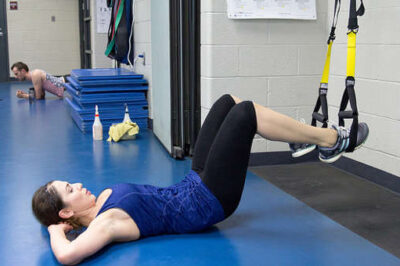“Plateau.” It’s a negative word in the fitness world that symbolizes stagnation, boredom, frustration and an unbearable lull in one’s progress.
“I dropped 15 pounds so fast, but the last five won’t budge, and it’s been two months!”
“I’ve been adding 10 pounds a month to my back squat for almost a year, but this week I lifted 20 pounds less than my personal record! What’s going on?”
As beings who relish achieving goals and reaching new milestones, plateaus are discouraging, disconcerting and even depressing places to be. So understandably, we’re eager to find the quickest way off the plateau and on to the nearest mountain peak. Either that, or we give up altogether, only to find ourselves back to square one in a couple of months. But despite our insistence that there is absolutely no reason to explain the perplexing stall in our progress, plateaus can often be narrowed down to three culprits.
Today, I’m going to talk about Culprit No. 1:
Subpar Nutrition
When we first commit to hopping on the Healthy Bandwagon and eating more veggies, less sugar, more protein, less trans fats and so on, we’re enthusiastic and full of hope, almost giddy enough for people to think we have a new crush. We diligently plan and portion our meals, ask the waiter to take away the breadbasket lest it tempt us and happily sip our herbal tea while friends imbibe with alcohol. You know the drill.
But for most of us, a single moment of weakness, which is inevitable yet not insurmountable, leads down a steep, slippery slope littered with one nutrition blunder after another. We become complacent and hope somehow that our bodies won’t notice that our oatmeal has been replaced with cream cheese bagels and our black, almond milk-sweetened coffee with chocolate chip Frappuccinos. Maybe my workouts will offset the damage.
And that is what they call “wishful thinking.”
For many women I know, a major issue is not consuming enough calories. The human body can become quite efficient with calories and can sometimes struggle to progress. When this happens, upping our caloric intake by a few hundred calories will signal to our bodies that they aren’t starving and that it’s time to stop hoarding calories and storing them as fat. The increase will tell your body to burn calories as fuel and to use them to build new muscle.
If you suspect you’ve been under-eating, consider adding 250-500 calories to your daily total (250 for women, 500 for men, is a general recommendation). It might be all you need to shock your system off its plateau! If, however, you realize you fell off the bandwagon weeks ago and admit to indulging in one too many well-deserved “treat meals” or celebrating a plethora of “special occasions,” then it’s time to keep a food journal, find an accountability partner, clean out your pantry and fridge if needed and get ready for the momentum to pick back up!
On a personal note, about a year and a half ago, I was frustrated with my fitness. I felt lethargic during workouts, wasn’t getting stronger, and wasn’t recovering as well as I once did. I reached out to my good friend Michael Prince, the man who first introduced me to weightlifting back in high school, and asked him for his advice. Two simple words were enough to make the plateau quake beneath my feet: “Eat more!”
After just a few weeks of consistently eating a few hundred more calories (quality calories, by the way, not Starbursts and Pringles), my energy levels were boosted, I was hitting new one-rep maxes on my lifts (squat, deadlift, clean and jerk), and wasn’t feeling nearly as sore or exhausted because my body had the necessary amount of macronutrients, namely protein and carbohydrates, to repair and rebuild my muscles. In addition, my muscle definition became more apparent due to my increased carb intake. When you’re healthy, your external appearance and internal feeling will simultaneously show it!
If you’re currently camped out on a dreaded plateau, I hope you’ve found today’s post useful! Comment below or tweet me @dandersontyler to share what you’re going to change in order move onward and upward! I’ll be back next week to uncover Culprit #2!
Fit Fact: Research shows that if you wait several hours post-training to consume carbs, you will reduce your glycogen repletion rate by as much as 50 percent. Not consuming enough carbs after exercise can also exacerbate inflammation, depress immunity and lead to prolonged muscle soreness. {eoa}
Diana Anderson-Tyler is the author of Creation House’s Fit for Faith: A Christian Woman’s Guide to Total Fitness, Perfect Fit: Weekly Wisdom and Workouts for Women of Faith and Fitness, and her latest book, Immeasurable: Diving into the Depths of God’s Love. Her popular website can be found at dianadeadlifts.com, and she is the owner and a coach at CrossFit 925.
For the original article, visit dianadeadlifts.com.








Leave a Comment
You must be logged in to post a comment.